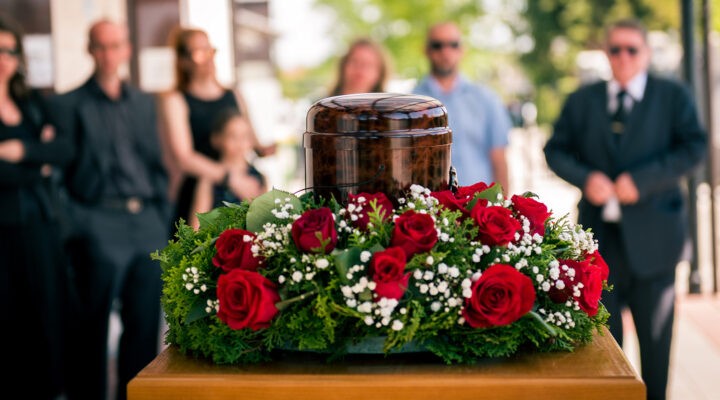The preacher at the memorial service no doubt thought he was giving a message of comfort to those who had lost a loved one. The central thrust of his message was that it was Jim’s time to go. Apparently, this was the kind of message he had repeated many times before.
Jim was my wife’s younger brother, and the memorial service had been delayed a year because of COVID. Jim was in his early fifties when he went into the hospital with the virus. Within a week, he died on a respirator.
Neither my wife, Joyce, nor Jim’s widow found comfort in the message the pastor brought. The idea that God had decided it was Jim’s time to die seemed repulsive to them. Did God arrange for him to get the disease? Did God make sure that efforts to cure him would be inadequate? Was the death something just fated to occur from the time he was born?

David Holley
It’s one thing to say that God has made a world in which things such as premature death sometimes happen. It’s another to imagine that God is picking out who will die and deciding how each death will occur.
The preacher, of course, thought about things differently. He imagined there was something comforting about thinking how long each person lives is in God’s hands. Thinking that God had made the choice was for him a way of saying it was somehow for the best, even if you can’t see why, because you don’t know everything God knows. Trusting that God is in control was for him a way of avoiding the futility of “what ifs” that so often lead us to spin our mental wheels. Instead of imagining it could have been different, he thought we should just content ourselves with the affirmation that God is in control and knows how things should go.
As pious as all that might sound, it leads us down a path we should be reluctant to take. Once we start thinking that lamenting what happens is somehow setting ourselves up in opposition to divine wisdom, we have to squash our own sense that some things that happen are terrible evils. Admittedly, this sense is not perfect. We don’t always see the big picture. But even in the big picture, it is hard to accept some of what happens as for the best. Even if we can go on after the death of a 3-year-old, doing the best we can and experiencing gratitude for the years we had, it is gruesome to attribute her death to some kind of calculation God made.
Part of what makes terrible events bearable is the realization that there are forces other than God that affect what happens in the world. Given the way the physical order works, there will be consequences to an auto collision at high speed that might include death or serious injury. And in a world where people make choices, harm or death may come from the careless or intentional acts of others.
“Part of what makes terrible events bearable is the realization that there are forces other than God that affect what happens in the world.”
We know we live in a world where such risks exist, and we can recognize the risks without imagining that God has decided our time to die has come. Some biblical writers lived in an era when the distinction between what God did and what was done by physical forces or human acts was not clearly drawn. Thinking of God as the cause of everything that happens, they regarded a plague killing thousands or Pharoah’s hardening of his heart to be things God did. But we don’t have to think that way. We don’t have to blame God when the cause-and-effect structure of the world leads to unfortunate results.
Or do we? Some would say whatever happens is something God could have prevented, so in deciding not to prevent it, God is deciding it should occur. I suspect they are overconfident in their ability to know what God can do in any situation.
If God seeks to create a world in which finite things have real powers to produce results, creation can be thought of as a kind of letting go of power on God’s part. If God intends to make a world in which the script of what happens is not something that is decided in advance, then what happens may depend on how created beings use their powers.
The Gospels suggest that Jesus’ ability to do “deeds of power” was limited by the unbelief or unreceptiveness of people (Matthew 13:38). More generally, we might suspect that some things we can imagine God doing might be blocked by a created order that has been given its own powers.
“I don’t think God specifically picked out Jim and declared it was his time to die.”
Thinking this way doesn’t make it hurt less when terrible things happen. But is it any better to think God has decided that they happen? All the dangers and risks are still there, whether you think God has sent them or not. But if you think God has sent them, you need to imagine there is a hidden reason that shows it is all for the best.
You might be able to conceive of such a reason in some cases, but thinking there has to be a reason sows the seeds of doubt. It’s a short step from thinking there is a reason you can’t imagine to thinking there is no such reason and to rejecting the kind of God who sends terrible things.
I don’t think God specifically picked out Jim and declared it was his time to die. Looking at the kind of world we live in gives us reason to doubt that God’s providential order is a matter of controlling each event. God’s letting go of total control makes possible a world where wonderful things can happen, but also terrible things.
I like to think that God rejoices with us in the wonderful things and grieves with us in the terrible things. Our grief may be tempered by the thought that God has an ultimate purpose for us. However, we can accept such a purpose without viewing whatever happens as for the best.
David M. Holley taught philosophy for 40 years at universities in Kansas, Arizona and Mississippi. His books include Meaning and Mystery: What It Means to Believe in God, and he has published numerous articles in professional journals on topics in philosophy of religion and ethics. He is currently retired and lives in Texas with his wife, Joyce. They are members of Peace of Christ Church in Round Rock, Texas. His newest book is Changing Your Mind Without Losing Your Faith.
Related articles:
7 tips on giving that eulogy, when the time comes | Opinion by Mark Wingfield
Have eulogy, will travel | Opinion by Russ Dean


